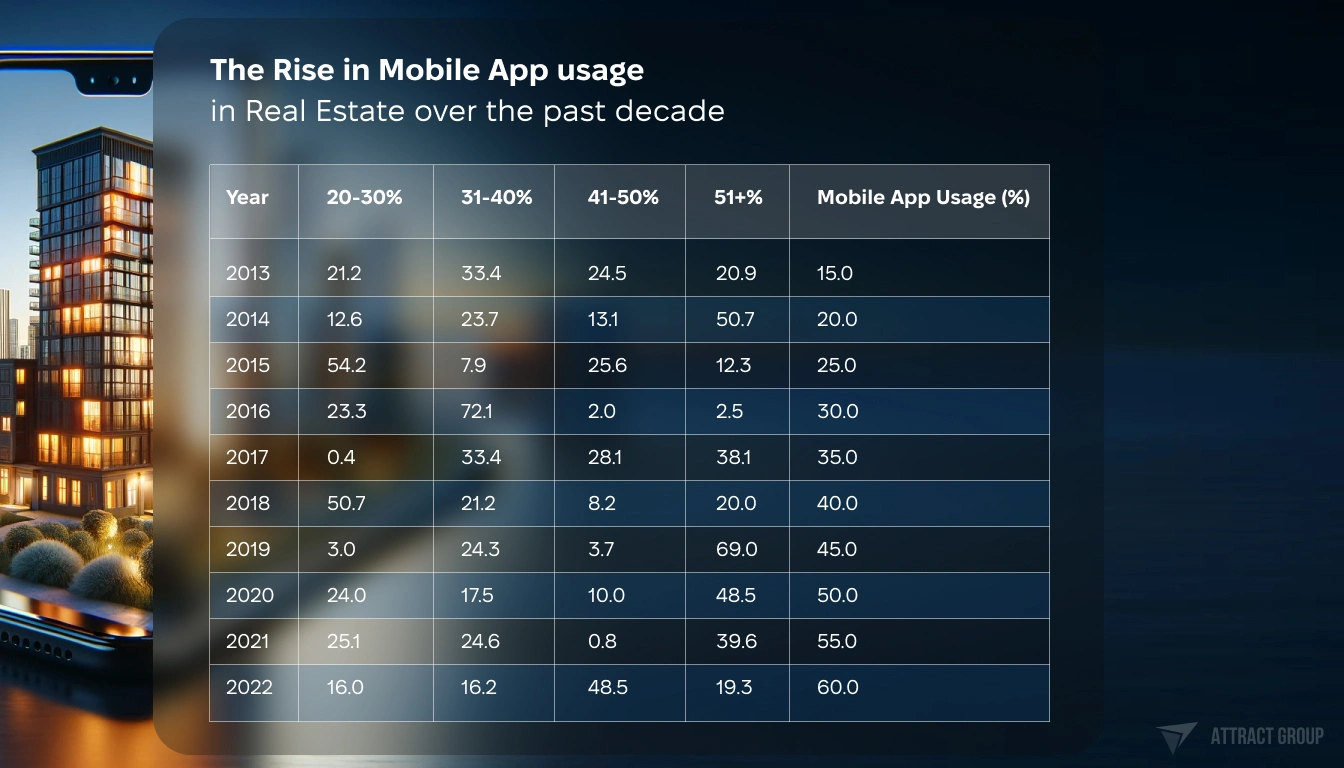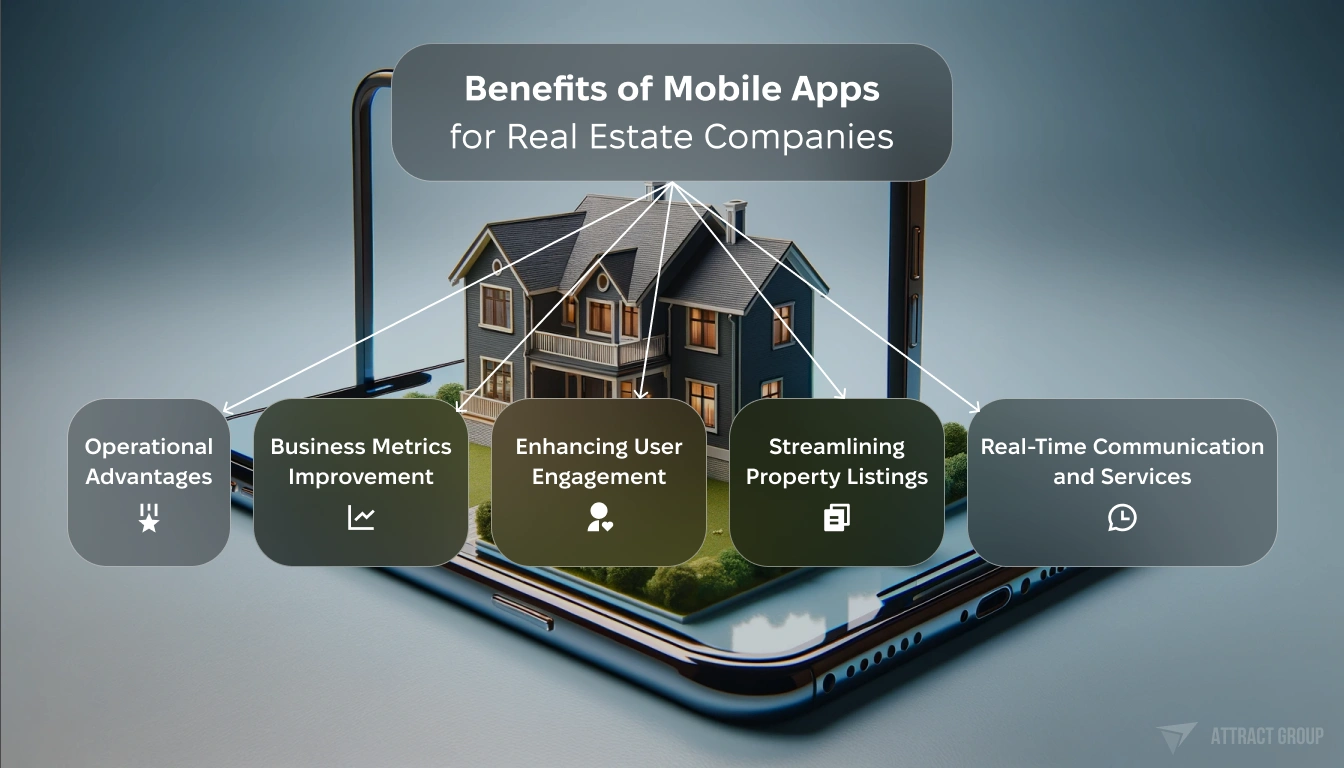Real Estate Mobile App Development: Cost, Key Features, and Strategic Benefits
 20 November 2023
20 November 2023The last decade has witnessed a staggering upswing in mobile app development, with the real estate sector riding the crest of this digital wave. In an age where instant access to information is the norm, the demand for comprehensive real estate mobile apps has surged, fundamentally reshaping the interaction between real estate companies, agents, buyers, and investors.
With a mobile-first approach, these apps serve as powerful tools, offering features like real-time listings, virtual tours, and detailed property information at the touch of a button.
According to a National Association of Realtors report, over 81% of older millennials, 80% of younger millennials, and 78% of Generation X found their home on a mobile device. The same report highlights that 68% of new home shoppers agree that mobile apps make the real estate process easier and more efficient.

However, mobile real estate apps offer an unparalleled strategic edge in the competitive property sales and management arena. These apps streamline task management, client communication, and agent service delivery, enhancing overall productivity.
For clients, the intuitive features of real estate apps simplify the search and transaction processes, imbuing them with a sense of control and efficiency.
Understanding the Market: Real Estate Mobile Apps
The landscape of property dealing is transforming with the advent of mobile real estate apps. These platforms have become a cornerstone for industry players, providing vital insights and facilitating a more streamlined, user-centric experience.
The real estate mobile app market thrives on innovation, with developers consistently integrating advanced features like 3D property tours and real-time alerts to meet the rising expectations of tech-savvy homebuyers and investors. A recent study indicates that mobile apps now account for over 56% of all time spent on digital real estate listings.
Cost of Developing a Real Estate Mobile App
This section will provide a concise overview of the cost considerations for developing a real estate mobile app:
- Understanding Investment Requirements. The investment required to develop a real estate mobile app can vary widely based on the app’s complexity, features, and the developer’s rates. Budgeting for the entire app development lifecycle, including design, development, testing, and deployment, is crucial.
- Factor-Driven Cost Analysis. Several factors influence the overall cost, such as the choice between native or cross-platform development, the complexity of features like 3D tours or AR capabilities, and the integration of real-time databases for listings and property management.
Here’s a table outlining the rough cost range for different features of a real estate mobile app:
| Module Name | Cost Estimate (USD) |
|---|---|
| User Registration/Authentication | $2,000 – $4,000 |
| User Profile Management | $1,500 – $3,000 |
| Property Listing | $4,000 – $6,000 |
| Property Search & Filters | $3,000 – $5,000 |
| Property Details View | $2,000 – $4,000 |
| Image Gallery for Properties | $2,500 – $4,500 |
| Map Integration | $2,000 – $4,000 |
| Favourites/Bookmarking | $1,500 – $3,000 |
| Push Notifications | $1,000 – $3,000 |
| In-App Messaging/Chat | $3,000 – $5,000 |
| Appointment Scheduling | $2,500 – $4,500 |
| Agent/Broker Profiles | $2,000 – $4,000 |
| Review and Ratings System | $2,000 – $4,000 |
| Mortgage Calculator | $1,500 – $3,000 |
| Integration with CRM | $3,000 – $6,000 |
| Analytics Dashboard for Users | $2,500 – $5,000 |
| Admin Panel for Content Management | $4,000 – $7,000 |
| Payment Gateway Integration | $2,500 – $5,000 |
| Social Media Integration | $1,500 – $3,000 |
| SEO Optimization | $1,500 – $3,000 |
| Data Encryption & Security | $3,000 – $5,000 |
| Cloud Storage Integration | $2,000 – $4,000 |
| AI-based Property Recommendations | $4,000 – $7,000 |
| Augmented Reality for Virtual Tours | $5,000 – $10,000 |
| User Feedback System | $1,500 – $3,000 |
| Multi-language Support | $2,000 – $4,000 |
| Reporting & Statistics for Admin | $3,000 – $6,000 |
| Compliance with Legal Standards | $2,000 – $4,000 |
| Ongoing Maintenance & Support | $1,000 – $3,000/month |
| Marketing Tools Integration | $2,000 – $4,000 |
| TOTAL: | $70.000 – $130,000 |
Very roughly the total cost to develop a real estate mobile app would be in the range of $70.000 – $130,000. These are rough estimates and can vary significantly based on specific requirements, the complexity of the design, and the location of the development team. It’s also important to factor in ongoing costs such as server hosting, maintenance, updates, and marketing.
Receive a free quote and start planning your investment wisely
Monetization Strategies for Real Estate Mobile Apps
This section covers monetization strategies for real estate mobile apps, focusing on choosing a revenue model that aligns with user experience.
Choosing the Right Revenue Model
An effective monetization strategy is crucial for the success of your real estate mobile app. Options range from in-app advertising, featuring listings for a fee, to offering premium services like personalized real estate insights or advanced search filters.
Balancing Monetization and User Experience
It’s vital to balance monetization and user experience. Intrusive ads may deter users, so consider native advertising or sponsored listings that provide value. Subscription models for premium features can also be lucrative without compromising the user interface.
Planning Your Real Estate Mobile App
- Identifying Core Objectives. Before embarking on the app development journey, defining what you want your real estate mobile app to achieve is crucial. Whether it’s to provide real-time listings, enable seamless agent-client interactions, or offer virtual property tours, the app’s objectives must resonate with the core needs of your target market.
- Aligning with Market Needs. The most successful real estate mobile apps are those that align with the demands of the market. This means before building a mobile app, you must understand the features that users find most valuable, such as advanced search filters, favorite properties, and neighborhood insights.

By aligning your app’s offerings with these needs, you position your product as an indispensable tool for the modern real estate enthusiast.
Key Features of a Successful Real Estate Mobile App
The cornerstone of any successful real estate mobile app is its features. Essential components like advanced search filters, detailed property profiles, and interactive maps are not just add-ons but fundamental necessities that define the app’s efficacy. These features facilitate a seamless user experience and significantly contribute to the business value by engaging users and encouraging transactions.
However, the right mix of features can transform a simple app into a powerful business tool. Features that offer personalized recommendations, push notifications for new listings, and the ability to schedule viewings directly through the app play a critical role in enhancing user engagement.
Moreover, they add tangible business value by optimizing the sales funnel and improving conversion rates.
Essential Features
1. Advanced Search and Filters:
- Allows users to find properties based on specific criteria such as location, price, property type, size, and other attributes.
- This feature helps narrow options and find exactly what the user is looking for.
2. Detailed Property Profiles:
- Each listing should have a comprehensive profile that includes photos, descriptions, price details, amenities, and other relevant information.
- The more detailed the profile, the easier for users to make informed decisions.
3. Map Integration:
- Viewing properties on a map gives users a better sense of the property’s location.
- Integration with satellite and street views enhances the user experience by providing realistic area visuals.
Advanced Features
4. Real-Time Notifications:
- Users receive alerts for new listings, price changes, and other updates relevant to their search criteria.
- This feature keeps users engaged and informed about the latest market developments.
5. Personalized Recommendations:
- The app learns from user preferences and search history to suggest properties that might interest them.
- This personalization enhances the user experience and can lead to quicker decision-making.
6. Direct Scheduling for Viewings:
- Users can schedule property viewings directly through the app.
- This feature adds convenience and streamlines the process of arranging viewings.
Optimized Sales Funnel:
- Combining these features helps nurture leads and guide potential buyers through the sales process more efficiently.
- The app can improve conversion rates by enhancing user engagement and providing valuable information.
Property Listings Feature
- Integration Essentials: A robust property listing feature is at the heart of any real estate app’s functionality. Integrating comprehensive listings with high-quality images and virtual tours allows users to explore properties conveniently, which is vital for user retention and satisfaction.
- Design Considerations: When designing the listings feature, user-friendliness should be paramount. Easy navigation, quick loading times, and the ability to save favorites are key design elements that make property searches intuitive and enjoyable for the user.
CRM Integration in Real Estate Mobile Apps
- Seamless Software Integration: Integrating CRM software into a real estate mobile app can revolutionize agents’ management of client relationships. It enables the storage and analysis of customer data, leading to more personalized interactions and improved sales strategies.
- On-the-Go CRM Benefits: The benefits of CRM features within a mobile app are manifold for agents and clients alike. Agents can access client information on the move, while customers enjoy a more tailored service. This level of convenience and customization sets apart leading real estate mobile apps in a crowded marketplace.
Mobile App UI/UX Design in Real Estate Apps
- Retention Through Design: A real estate mobile app’s UI/UX design is crucial to its success. A design that mirrors the ease and immediacy of the best web-based platforms ensures that users stay longer and engage more deeply with the app.
- Impactful UI Elements: The inclusion of high-quality imagery, streamlined property comparisons, and an effortless checkout process are UI elements that can significantly elevate the user experience. The goal is to create a visually appealing and highly functional interface.
Benefits of Mobile Apps for Real Estate Companies
- Operational Advantages. Adopting mobile solutions offers real estate companies significant operational benefits. Mobile apps can transform various facets of the real estate business, from streamlined property management to enhanced customer service. For instance, mobile CRM integration allows for better lead tracking and customer engagement, while push notifications keep users updated on new listings and market trends.
- Business Metrics Improvement. Real estate mobile apps also play a pivotal role in improving business metrics. They provide real-time data and analytics, which help companies make informed decisions. Moreover, features like virtual tours and neighborhood information can lead to higher conversion rates and increased user satisfaction.
- Enhancing User Engagement. User engagement is another critical area where mobile apps add value. By incorporating features such as search filters, favorite properties, and 3D tours, real estate companies can offer a more interactive and user-friendly experience. These features cater to the demand for innovative and efficient property searches and encourage users to spend more time on the app, thus increasing the likelihood of a transaction.
- Streamlining Property Listings. Efficient property listing management is essential for real estate companies, and mobile apps offer an effective solution. Real estate apps can provide comprehensive and up-to-date listings by integrating MLS (Multiple Listing Service) databases. This integration and the ability to submit or remove listings through an administrative panel simplifies the process for realtors and sellers.
- Real-Time Communication and Services. Integrating on-demand services in real estate mobile apps has revolutionized real-time communication and services delivery. With the tap of a button, rental applicants can schedule viewings, investors can receive customized property reports, and agents can instantly respond to inquiries, making the whole real estate process even more efficient.

Mobile App Development for Real Estate Agents
In this section, we will explore the importance of mobile app development tailored for real estate agents, emphasizing features that boost efficiency and compliance with industry standards. Let’s get in!
- Customizing for Efficiency. For real estate agents, efficiency is paramount. Developing a mobile app tailored to their specific needs can significantly enhance productivity. Features like calendar integration for scheduling showings, document management for easy access to contracts and disclosures, and real-time chat functionalities can save time and streamline daily tasks.
- Feature-Rich Mobile Apps for Agents. The best mobile apps for real estate agents are feature-rich, catering to every aspect of their business. From lead management features that aid client tracking to comparative market analysis tools that offer valuable insights into pricing trends, these apps serve as comprehensive digital assistants for agents.
Additionally, integrating CRM functionalities allows for meticulous follow-ups and personalized communication with clients, which is crucial in the real estate domain.
- Enhancing Listing Management. Effective listing management is a core function of a real estate agent’s mobile app. The ability to update listings, manage property photos, and edit details on the go ensures that the information is current and helps respond quickly to market changes. Features that allow users to share listings across social platforms easily can also significantly widen the reach and attract potential buyers.
- On-the-Go Accessibility. Mobile apps designed for real estate agents must prioritize on-the-go accessibility. This means cloud-based solutions that allow agents to access data from any device, push notifications for instant updates on client activity, and GPS functionalities to guide agents to properties efficiently. These mobile solutions enable agents to be more responsive and provide top-notch service to clients anywhere, anytime.
- Security and Compliance. Given the sensitive nature of real estate transactions, mobile apps must also focus on security and compliance. Features such as secure messaging, encrypted data storage, and compliance with real estate regulations ensure that client information is protected and that agents adhere to industry standards.
Real Estate Mobile App Development Company Selection
This section provides a concise guide on selecting a real estate mobile app development company, emphasizing the importance of expertise, development capabilities, comprehensive service offerings, and collaborative support.
Evaluating Expertise and Experience
Choosing the right development company is critical. You’ll want a team that understands the nuances of the real estate market and has a proven track record in creating successful mobile applications. Their portfolio should showcase various real estate mobile apps with features catering to various business aspects, from property listings to CRM integrations. You should also can discover Top 50 Places where you can Find the Best Mobile App Development Company.
Assessing Development Capabilities
It’s essential to assess the technical capabilities of a potential real estate app developer. They should be proficient in the latest technologies and able to integrate advanced features such as MLS integration, 3D property tours, and neighborhood information. The ability to incorporate AI for predictive analytics or AR for virtual staging could give your app a distinct advantage in the market.
Understanding the Service Offerings
A competent mobile app development company should offer a full spectrum of services, encompassing custom app design, development, testing, and post-launch support. Their approach should be holistic, ensuring that every aspect of the app is optimized for the best user experience and performance.
Prioritizing Collaboration and Support
An ideal developer will prioritize close collaboration with their clients, offering continuous support throughout development. Look for companies that provide transparent communication, regular updates, and maintenance services to keep the app up-to-date with the latest real estate market trends and technological advancements.
Legal and Compliance Aspects in Real Estate Mobile Apps
- Navigating Real Estate Laws. Real estate mobile apps must navigate a complex landscape of property laws. Ensuring that the app complies with local regulations concerning property listings, transactions, and data privacy is essential.
- Data Protection and Privacy. With apps handling sensitive user data, adhering to data protection laws such as GDPR for European users or CCPA in California is paramount. Secure user authentication and encrypted data storage are not just features but necessities.

Ensuring that your real estate mobile app adheres to these legal and compliance requirements is not just about following the law; it’s about building trust with your users and establishing credibility in the real estate market.
Analytics and Performance Tracking for Your App
- Implementing Analytics Tools. Incorporating analytics tools into your real estate mobile app provides insights into user behavior, feature usage, and overall app performance. These metrics are crucial for iterative development and user retention strategies.
- Performance Metrics to Track. Key performance indicators for real estate apps include active user rates, session times, and conversion rates from listings to inquiries. Monitoring these can help in refining app features and improving the user experience.
Tracking performance and user interaction through analytics is essential for staying competitive in the fast-paced real estate market. It allows for data-driven decisions that significantly enhance the app’s effectiveness and user satisfaction.
Conclusion
In conclusion, the rise of mobile apps in the real estate sector marks a significant shift in how agents and clients engage with property markets. Embracing this technology offers a competitive edge, operational efficiency, and a personalized user experience. As the industry continues to evolve, staying ahead means constantly innovating and leveraging these digital tools to meet the ever-changing demands of the real estate landscape.
Begin your journey towards digital transformation










